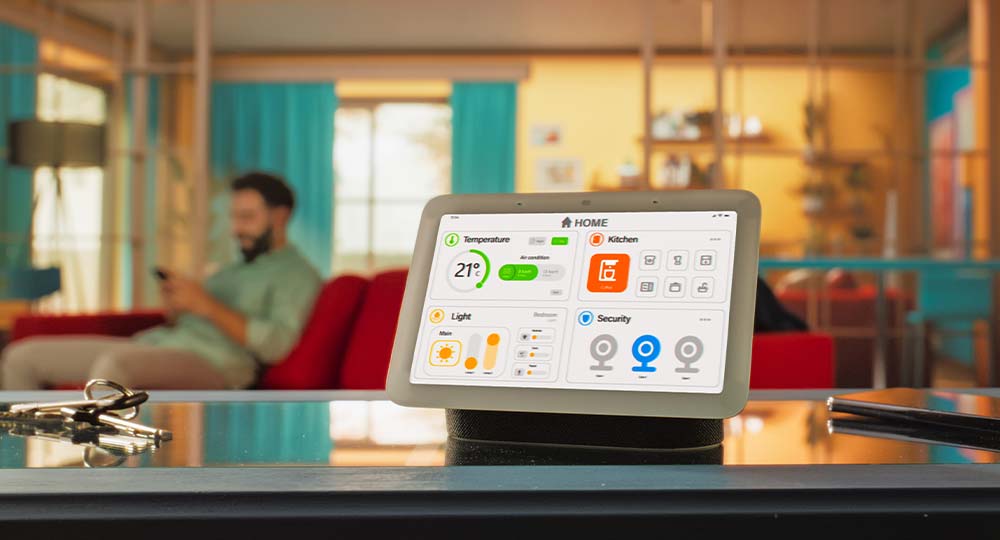Insurance | August 22, 2025
Smart home technology is no longer just about convenience—it’s about home safety, insurance savings, and risk prevention. The Internet of Things (IoT) has empowered homeowners with innovative tools to detect risks, prevent damage, and alert them in real time.
How Do Smart Smoke Detectors Protect Your Home?
Traditional smoke detectors are helpful for alerting residents to a fire. This is great if someone is home. What happens when no one is around to hear the alarm?
With smart fire detectors, the homeowner can receive an alert via any Wi-Fi-connected device anywhere in the world. This can decrease emergency response time, potentially reducing damage to the home.
Why do fire alerts matter?
- Real-Time Alerts: Get notifications sent to your phone, even if you’re away
- Emergency Response: Faster action when time matters most
- Damage Prevention: Lower risk of major loss thanks to early detection
- Peace of Mind: Stay protected whether you’re at work, on vacation, or asleep
By combining early detection with remote alerts, smart fire detectors offer powerful protection that traditional alarms simply can’t match.
Can Smart Leak Detectors Prevent Water Damage?
Water damage is one of the most common and expensive homeowners insurance claims, with the average loss exceeding $11,000. Burst pipes and leaky appliances can cause extensive damage to a home. Smart leak-detection sensors can reduce or even prevent these costly disasters. The sensor will alert homeowners immediately when a leak is detected, allowing them to take action to stop the water invasion.
Why do water alerts matter?
- Leak Detection: Catch leaks early from appliances, pipes, or water heaters
- Instant Alerts: Receive notifications on your phone so you can act fast
- Damage Control: Prevent costly water damage and mold remediation
- Insurance Savings: Reduce claims by addressing issues before they escalate
With fast alerts and early intervention, smart leak detectors can turn a potential disaster into a minor inconvenience.
How Do Smart Devices Help Prevent Break-Ins?
Smart technology has enhanced security measures on many fronts. Homeowners can keep tabs on their property by monitoring video surveillance from anywhere, deter thieves with timed lighting, and use smart door locks to maintain tighter security of their entryways. Plus, affordable, wireless technology makes installing security systems easier than ever before.
Why do burglar alerts matter?
- Remote Monitoring: Keep an eye on your home through smart cameras and apps
- Smart Lighting: Use timed or motion-activated lights to make your home look occupied
- Secure Entry: Control access with smart locks and real-time monitoring
- Easy Setup: Install wireless systems without professional help
Smart security tools give you more control, visibility, and peace of mind—no matter where you are.
Tip: Many insurance carriers offer discounts for professionally monitored security systems.
Can Smart Devices Reduce Fire and Electrical Risks?
Electrical issues are a leading cause of house fires and appliance damage—often without warning. Smart electrical panels and energy monitors can track your home’s power usage in real time and alert you to irregularities like voltage spikes or tripped circuits. Some devices even notify you if critical appliances, like a refrigerator or sump pump, suddenly lose power.
Why do power and electrical alerts matter?
- Voltage Spikes: Detect surges before they cause damage
- Appliance Monitoring: Get alerts if critical appliances lose power
- Fire Prevention: Catch overloaded circuits early to reduce fire risk
- Electronics Protection: Prevent costly damage to devices and HVAC systems
By detecting issues early, these systems help protect your home and give you peace of mind, whether you’re at home or away.
How Can Smart Thermostats Prevent Frozen Pipes?
When temperatures plunge below freezing, the risk of burst pipes rises sharply—especially in basements, crawlspaces, or unheated areas. Smart temperature sensors or connected thermostats can send real-time alerts if indoor temps fall too low, helping you take action before water damage occurs.
Why do temperature and freeze alerts matter?
- Freeze Prevention: Stop frozen or burst pipes during cold snaps
- Remote Monitoring: Keep an eye on vacant homes, cabins, or vacation properties
- Smart Integration: Pair with shutoff valves for automatic water protection
- Cost Savings: Avoid expensive repairs from water damage and insurance claims
Even if you’re miles away, these smart systems help keep your home protected through every season.
Here are the most common home insurance claims and their average costs nationwide:
| Type of Claim | % of All Home Insurance Claims | Average Cost of Claim (Nationwide) |
|---|---|---|
| Water Damage & Freezing | ~24% | $11,500–$12,500 per claim |
| Fire & Lightning | ~23% | $80,000+ per claim |
| Burglary/Theft | ~1% | $4,000–$5,000 per claim |
Source: Insurance Information Institute (III.org)
Should Homeowners with Smart Devices Worry About Data Privacy?
Smart home devices make life safer and easier—but they also collect and transmit data. From your daily routines to security footage, sensitive information could be at risk if not properly protected.
The good news: with a few proactive steps, you can enjoy the benefits of smart technology without compromising privacy.
How Can Homeowners Protect Smart Home Data?
- Strong Passwords: Use strong, unique passwords for each device (avoid reusing your Wi-Fi password)
- Two-Factor Authentication: When available add a second step like a text code, authenticator app, or fingerprint
- Software Updates: Keep devices updated with the latest software patches to close security gaps
- Secure Wi-Fi: Secure your Wi-Fi network with strong encryption and a hidden SSID
- Data Sharing: Review app permissions and limit unnecessary access
When homeowners take these precautions, smart devices can remain powerful tools for safety without creating unnecessary digital risks.
What Insurance Gaps Should Homeowners Know About?
Beyond enhancing your safety, smart home devices may also unlock savings on your homeowners insurance. Many insurance providers now offer discounts for proactive risk-reducing technologies like smart smoke detectors, water leak sensors, and security systems. These devices can serve as a signal to insurers that you’re taking steps to prevent costly claims—and may qualify you for policy credits or lower premiums.
It’s also important to understand what your current policy actually covers. Some common threats that may not be included in standard homeowners insurance include:
- Water Backup: Damage from sump pump or sewer failure
- Power Surges: Harm to electronics or appliances from sudden spikes
- Flooding: External water sources, often requiring separate flood insurance
- Earthquake/Windstorm: Risks in high-hazard zones that may need extra coverage
Adding smart devices can help detect these issues early, but make sure you’re also protected with the right insurance riders or add-ons. When in doubt, connect with your insurance agent to review your coverage and explore how the right mix of tech and protection can save you stress and money.
Save Money with Smart Tech Discounts
From fire and water damage to break-ins and freezing temperatures, smart home technology offers a proactive way to protect your home and your peace of mind. These connected devices not only help reduce risk but may also qualify you for insurance discounts, making them a smart investment for safety and savings. Whether you’re looking to upgrade one device or build a fully connected home, taking even small steps today can help you outsmart tomorrow’s disasters.
At Forward Insurance, we understand the evolving landscape of smart home technology and its impact on insurance. Contact us today to discuss how you can maximize your insurance savings with smart home devices while ensuring the safety and security of your home.








 Email
Email